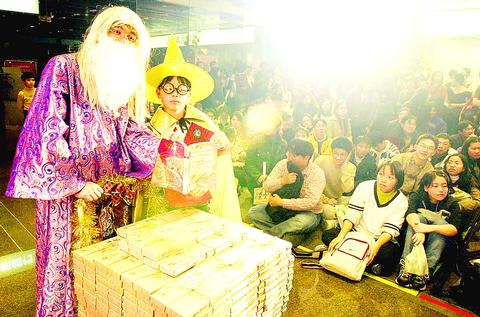"I have to thank Harry Potter for opening the market for fantasy literature in Taiwan," said Lin Tsai-chueh (林載爵), editor in chief of Linking Publishing, in a speech promoting his company's new translation of The Lord of the Rings.
Despite Tolkien fans' dismissal of Harry Potter, Lin said the books' success did help The Lord of the Rings come back to the market.

TAIPEI TIMES FILE PHOTO
However, compared with the zealous, grassroots publicizing of Rings fans, the Harry Potter frenzy in Taiwan has been rather dependent on well-designed market and media strategies.
"The hype surrounding Harry Potter has happened with perfect timing, perfect placement, and having had the right people work on it. Everything was in place," said Joyce Lu (
The fourth Harry Potter volume was just released at the end of last year and has already sold a record 600,000 copies. The first to the third volumes have sold 2 million copies altogether. There is no doubt that Harry Potter is the best-selling book in Taiwan's publishing history.
What's more, Taiwan is the best-performing market in Asia by proportional standards. One in every 38 people in Taiwan have a copy of a Harry Potter book. In Japan, one in every 53 people have one and in China, one in every 625 people own a copy.
How did Crown do it? The timing is the first thing. When the first volume of the Chinese translation was about to launch in Taiwan in July of 2000, it was in tandem with the publication of the fourth volume in the UK and North America. Taiwan's news media provided blanket coverage of Western Potter fans queuing up at midnight, camping out in front of bookstores awaiting the release of the fourth book. "So the hype overseas immediately aroused media attention on the launch of our Chinese version," said Lu. Within weeks, sales reached 100,000 copies.
The Chinese translation of Harry Potter and the Sorcerer's Stone was the first book in Taiwanese history to be released at midnight (
"Six months is long enough to build fans' expectations, but not lose their interest in the sequel. It's also enough time for the market to digest the first episode," said Lu.
And so Crown now publishes consecutive Harry Potter books on a half-a-year basis. In July last year, they launched Magic Parade (魔法大遊行) as their third Potter promotional. Nearly 1,000 fans, mostly students, marched around Taipei in costumes portraying the characters in the Harry Potter stories.
And at the end of last year, in promotion of the fourth episode, Crown held a Competition of Witches (三巫鬥法大賽), which also attracted thousands of teenage fans.
Crown has also set up an on-line fanzine on books.com.tw a year ago, which is still published on a bi-weekly basis.
"Harry Potter was the only profit-maker in the book market in 2001," said one bookstore owner.
And now, with The Lord of the Rings approaching the front, Crown's Lu is still optimistic.
"Harry Potter has wide-range appeal, catering to both teenagers and adults. We believe sales for the next volume can only be better. And we are happy to see The Lord of the Rings succeed in Taiwan. It may be good for us, too," Lu said.

On April 26, The Lancet published a letter from two doctors at Taichung-based China Medical University Hospital (CMUH) warning that “Taiwan’s Health Care System is on the Brink of Collapse.” The authors said that “Years of policy inaction and mismanagement of resources have led to the National Health Insurance system operating under unsustainable conditions.” The pushback was immediate. Errors in the paper were quickly identified and publicized, to discredit the authors (the hospital apologized). CNA reported that CMUH said the letter described Taiwan in 2021 as having 62 nurses per 10,000 people, when the correct number was 78 nurses per 10,000

As we live longer, our risk of cognitive impairment is increasing. How can we delay the onset of symptoms? Do we have to give up every indulgence or can small changes make a difference? We asked neurologists for tips on how to keep our brains healthy for life. TAKE CARE OF YOUR HEALTH “All of the sensible things that apply to bodily health apply to brain health,” says Suzanne O’Sullivan, a consultant in neurology at the National Hospital for Neurology and Neurosurgery in London, and the author of The Age of Diagnosis. “When you’re 20, you can get away with absolute

May 5 to May 11 What started out as friction between Taiwanese students at Taichung First High School and a Japanese head cook escalated dramatically over the first two weeks of May 1927. It began on April 30 when the cook’s wife knew that lotus starch used in that night’s dinner had rat feces in it, but failed to inform staff until the meal was already prepared. The students believed that her silence was intentional, and filed a complaint. The school’s Japanese administrators sided with the cook’s family, dismissing the students as troublemakers and clamping down on their freedoms — with

As Donald Trump’s executive order in March led to the shuttering of Voice of America (VOA) — the global broadcaster whose roots date back to the fight against Nazi propaganda — he quickly attracted support from figures not used to aligning themselves with any US administration. Trump had ordered the US Agency for Global Media, the federal agency that funds VOA and other groups promoting independent journalism overseas, to be “eliminated to the maximum extent consistent with applicable law.” The decision suddenly halted programming in 49 languages to more than 425 million people. In Moscow, Margarita Simonyan, the hardline editor-in-chief of the